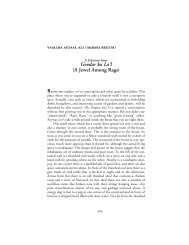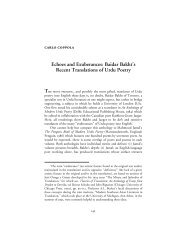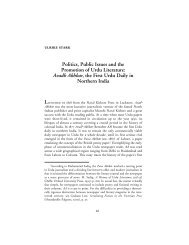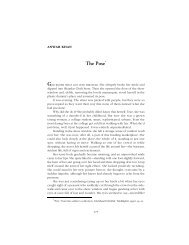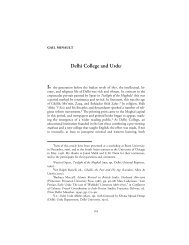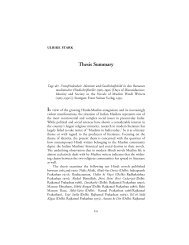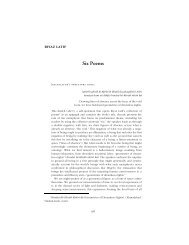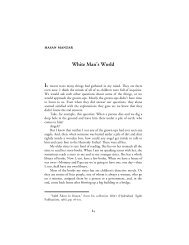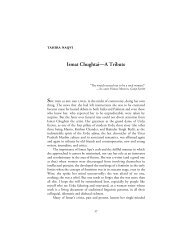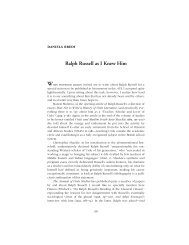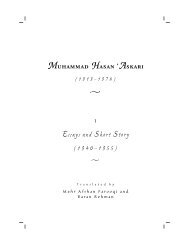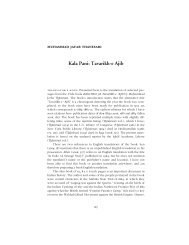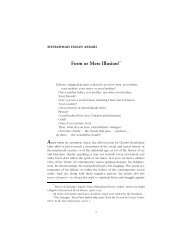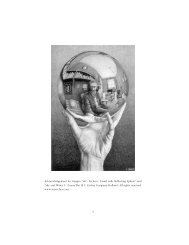Humor and Satire: Precolonial, Colonial and Postcolonial
Humor and Satire: Precolonial, Colonial and Postcolonial
Humor and Satire: Precolonial, Colonial and Postcolonial
- No tags were found...
Create successful ePaper yourself
Turn your PDF publications into a flip-book with our unique Google optimized e-Paper software.
christina oesterheld<strong>Humor</strong> <strong>and</strong> <strong>Satire</strong>: <strong>Precolonial</strong>, <strong>Colonial</strong><strong>and</strong> <strong>Postcolonial</strong>Laughter is one of the most vital <strong>and</strong> subversive forces in our lives. Differentforms of humor can be found in all cultures at all timesóprovidingcomic relief, easing tension, serving as an outlet for anger, aggression, pain<strong>and</strong> despair. Apart from common human weaknesses <strong>and</strong> follies, the alltoo-powerful,arrogant or sanctimonious <strong>and</strong> self-righteous have alwaysbeen favorite targets of humor, ridicule <strong>and</strong> satire. Often even the Divineis not spared. The ability to laugh at oneself reflects the inner strength, selfconfidence<strong>and</strong> the capacity for self-criticism of an individual as well as asociety. It makes a person more humane <strong>and</strong> a society more tolerant <strong>and</strong>balanced. Suppression of laughter, on the other h<strong>and</strong>, may lead to aggression,anxiety <strong>and</strong> hypocrisy, the latter of which is the l<strong>and</strong>mark of allrigid, oppressive societies. It is needless to say that the comic urge willalways find a vent. Thus closed, ideological regimes usually provoke thehighest number <strong>and</strong> best quality of political jokes.Urdu authors through the ages knew very well how to use all shadesof humor to amuse their audiences, to point out human weaknesses <strong>and</strong>to attack the high <strong>and</strong> mighty. They were able to draw on the extraordinarilyrich traditions of comic literature in Indic languages, Arabic <strong>and</strong>Persian <strong>and</strong> on a vibrant oral folk culture. This link remained strong untilthe nineteenth <strong>and</strong> early twentieth century, but seems to have becomemuch weaker now. In the present paper the main focus will be on thelinkages with popular culture <strong>and</strong> on religious topics as taken up in humor<strong>and</strong> satire. Starting off, as could be expected, with Mīr Jaʿfar ZaÅallī(1659?–1713?), it will not, however, deal with famous exponents of satire suchas Naīr Akbarābādī <strong>and</strong> Akbar Ilāhābādī, but rather, present a few samplesfrom two authors who are less known outside India <strong>and</strong> Pakistan.Let us first turn to the late seventeenth-early eighteenth century <strong>and</strong>the ZaÅalnāma in the critical edition compiled by Rashīd Ḥasan Khān64
Christina Oesterheld • 65(ZaÅallī 2003). His selection is based on the four oldest available manuscriptshe had before him which are dated between 1791–92 <strong>and</strong> 1797. Nomanuscript from ZaÅallīís lifetime exists, although he reportedly had compileda collection of his work with the title ZaÅalnāma. Thus we cannotbe certain even about the authenticity of the texts copied in the oldestmanuscripts. Later manuscripts <strong>and</strong> editions printed under ZaÅallīís name(Rashīd Ḥasan Khān alone browsed ten manuscripts <strong>and</strong> four print editionswhile working on his edition) contain many additions which point to thefact that his enormous popularity led to imitations <strong>and</strong> to a continuationof his writing style. Some linguistic <strong>and</strong> historical evidence clearly provesthat many of the additional texts are of a later date. Thus the question ofauthorship will be regarded as secondary; engaging with the corpus oftexts will be the primary concern. The sheer number of manuscripts <strong>and</strong>print editions is ample proof of the fact that this type of text was extraordinarilypopular among the educated, well-to-do classes who understoodenough Persian to enjoy them <strong>and</strong> who could afford to buy manuscriptsor, later, books, but in oral transmission also reached a wider, largely illiterateaudience.ZaÅallīís own dīvān is rather slim, <strong>and</strong> very little is known about his life.He is said to have been born into a Sayyid family in Nāranvāl/Narnaul(district Ludhiana), most probably during the reign of Shāhjahāñ (ibid.,12). He probably served in the army <strong>and</strong> at the courts of Aurañgzēbís sonsPrince Muḥammad Aʿam <strong>and</strong> later Prince Kām Bakhsh <strong>and</strong> took part inthe Deccan expeditions. It is reported that he was dismissed from serviceafter writing a very obscene satire on Prince Kām Bakhsh <strong>and</strong> then somehowreached Delhi (ibid., 14). His death is commonly blamed on theMughal emperor Farrukh Siyar, who is said to have gotten him killed inresponse to a sikka (verse composed on the occasion of the new coinstruck by the new emperor) ZaÅallī had composed on the occasion of hisascension to the throne. Here is the verse in question as translated byShamsur Rahman Faruqi:He struck his coin on grains of wheatAnd on coarse pulses, <strong>and</strong> (on) peas:Farrukh Siyar, that garrotter of a king.(2008, 3)Whether this anecdote is true or not, it demonstrates how muchpower was attributed to the word of the poet, which immediately cameinto wide circulation among all strata of society, literate as well as illiterate.The year of his death can thus be determined as 1125 ah/1713 ce. Sincehe has mentioned his age as sixty in one of his verses, one can deduce
66 • The Annual of Urdu Studies, No. 26that he was born before 1653. Faruqi, however, tentatively determines hisyear of birth as 1658 (ibid.).The active time of his life was dominated by Aurañgzēbís rise, hisconstant wars in the Deccan against the Marathas, the Sikhs, against therebelling Rajputs (RāÅẖōr Rebellion) <strong>and</strong> against princes aspiring for thethrone. After Aurañgzēbís death in 1707, the power struggles among hissons overshadowed decades to come, causing unrest, turmoil, bloodshed<strong>and</strong> devastation throughout North India. The reign of Bahādur Shāh I(Muʿaam Shāh) was comparatively peaceful, but at his death in 1712power struggles broke out again, culminating in 1713 when Jahāndār Shāhlost out against his rival, Farrukh Siyar, who had most of his enemieskilled in a very cruel fashion. ZaÅallī was an admirer of Aurañgzēb ʿĀlamgīr,although he criticized his long battles in the Deccan which created a powervacuum in the north, but he had a much more critical attitude towardAurañgzēbís sons.Today ZaÅallī is mostly remembered for his Rekhta verses in whichPersian <strong>and</strong> Urdu/Hindavī are often mixed in different ways in one line orone poem. The linguistic form was new, but the satirical mode, <strong>and</strong> especiallythe well-established genre of hajv, was not. For the present discussionwe will, however, concentrate on one of the lesser-known prosetexts of the ZaÅalnāma, the Akhbārāt-e Siyāha-e Darbār-e Muʿallā (OfficialDiary/News Account of the Exalted Court; an allusion to the imperialcourt diary siyāh-e ḥuẓūr established by Akbar) 1 which contains roughlyseventy-five entries. The main body of the texts is Persian, following theconventional akhbārāt pattern, followed by the Emperorís response,resumé or verdict in Hindavī. According to their contents, they can bedivided into the following groups:1. Texts with references to historical personalities <strong>and</strong> events: 24.2. Texts containing general wisdoms/sayings: 19.3. Texts referring to the author/persona of the author: 5.4. Obscene texts without any obvious reference to historical circumstances:26.5. Texts containing a parody of or comic allusion to religious terms<strong>and</strong> practices <strong>and</strong> popular beliefs: 4.These categories partly overlap, with number five being more or lessa subcategory of four. For the present purpose, examples will be chosenonly from these two categories. 2 Aquil has aptly described ZaÅallīís works1 Faruqi translates the title as ìUnedited Court Journalî (2008, 7).2 A number of examples with different content are presented by Faruqi <strong>and</strong> by
68 • The Annual of Urdu Studies, No. 26Here again we have mock Arabic forms (articles, prepositions) withthe basic vocabulary in Hindavī. The Hindavī words are partly onomatopoetic<strong>and</strong> can all be related to cohabitation. Hal means plow, but plowinga field/the earth may also be used as a circumscription or poetic imagefor sexual intercourse.Another charm full of obscenities is proposed for Kūn Shagūfa (AnusFlower) Bēgís sister who suffers from itching (entry 70, p. 76). The versewith a slight variation also appears as the opening of the hajv (lampoon/satire) on ʿIṣmatuín-Nisā Bēgam (157–58).Obscenities are spread all over the ZaÅalnāma <strong>and</strong> are often also connectedwith important personalities of the Mughal court. Only Aurañgzēbis spared such sl<strong>and</strong>erous treatment, but he is made to utter verses such asthose quoted above or to give his verdict in very colloquial languagethroughout the Akhbārāt. As Aquil stresses, ZaÅallī defied the rules ofproper behavior,[He] was direct, impolite <strong>and</strong> frivolous. However, it is important to rememberthat he was careful enough to not antagonize any guardians of Islamwho could retaliate with charges of heresies. He also did not mock theProphet <strong>and</strong> his companions [Ö](2009, 141)One conspicuous feature of later additions is that they are lessrespectful as far as the Mughal court is concerned. An illustration of thisdisrespect or disregard is the continuous use of the phrase ill-e shaiānī(Shadow of Satan) for the Emperor, a satirical distortion of the conventionalill-e subḥānī (Shadow of the Almighty). Here is an example fromthe London manuscript of Kulliyāt-e Jaʿfar ZaÅallī: 4 Yak tōla va panj māsharōz barāmda adrak ill-e shaiānī dīvān(-e) ghusalkhāna farmūd<strong>and</strong>[Ö] ([18th century], 25).As is quite obvious, these texts are mock versions or parodies of theoriginal format of newsletters. ZaÅallī (<strong>and</strong> later authors) followed theoriginal patterns <strong>and</strong> structures, but in most entries replaced the exactdate <strong>and</strong> time of the day with words from completely different contexts,such as ìone tōla <strong>and</strong> five māshaî (units of weight), as in the examplequoted above, or ìyak čūma va nīm siskīî (one kiss <strong>and</strong> half a gasp; 59),ìyak gaz va čahār girahî (one yard <strong>and</strong> four knots equals twelve fingers;60), or ìyak būñd va čahār čẖīñÅî (one drop <strong>and</strong> four splashes; 61), <strong>and</strong>introduced characters with funny, mostly obscene, names. These are the4 This manuscript contains several later additions. It was not among themanuscripts available to Rashīd Ḥasan Khān for his critical edition.
70 • The Annual of Urdu Studies, No. 26side by side, <strong>and</strong> in this case the Emperor himself is involved. As in thepresent example, the ZaÅalnāma is full of sodomites <strong>and</strong> catamites. Obsceneinvectives are the main device to ridicule <strong>and</strong> malign high-rankingrepresentatives of the Mughal state, particularly princes <strong>and</strong> nobles, <strong>and</strong>certain social types or functionaries, such as the qāẓī (judge). Many commentatorshave interpreted this harsh treatment as a social critique of thedebauchery <strong>and</strong> general moral decay of late Mughal society. Aquil writes:ìIn particular, he attacked their sexual licentiousness, mainly fascinationfor homosexual love, <strong>and</strong> the alleged unrestrained libido of their womenfolk,both in purdah <strong>and</strong> out of itî (2009, 145).Stories about the insatiable sexual appetite of women, about theirunfaithfulness <strong>and</strong> cunning, are stereotypes frequently encountered inmany entertaining as well as didactic Sanskrit <strong>and</strong> Arabic works. They seemto stem as much from male wishes to have full control over women as fromtheir erotic fantasies. Therefore, not all of it should be taken at its facevalue. Much has been written about homoerotic love in Persian <strong>and</strong> Urduliterature, hence there is no need to go into any detail here. The mainquestion should rather be whether ZaÅallī attacked the persons in questionmainly for their ìimproperî sexual behavior, or whether it was just atrope, a conventional form of criticism actually aimed at other failures orweaknesses.An author in ZaÅallīís position operated in the limited public sphere ofthe (mostly peripatetic) court as well as in the wider public spheres ofmilitary camps, bazaars, urban saloons <strong>and</strong> the countryside. Hence almostno sphere of life was alien to him. His works no doubt contain a strongelement of criticism, <strong>and</strong> he has clearly formulated his political concerns insome passages which deal with the untoward results of Aurañgzēbís longabsence from the north, the Emperorís lack of control over the nobles <strong>and</strong>their failure to fulfill their duties toward the Emperor, the state <strong>and</strong> theirsoldiers. In one episode he also refers to soldiers selling their arms whenthey have to go without pay <strong>and</strong> supplies for a long stretch of time (entry65, p. 75). Irresponsibility <strong>and</strong> selfishness come under strong attack in hiswriting. He was well aware of what happened all around him <strong>and</strong> of thestark contrast between individual behavior <strong>and</strong> social as well as religiousnorms. Thus the Persian saying ìkhū-e bad dar abīʿatī ke nishast na ravadjuz ba marg-e ū az dastî (You donít get rid of a bad habit until you die) isquite nonchalantly quoted two times with regard to reports about homosexualswho are unwilling to stop their sexual practices (entries 29 <strong>and</strong> 39,pp. 67 <strong>and</strong> 69). But it seems that the deplorable state of political affairs<strong>and</strong> its social consequences worried ZaÅallī more than unsanctioned sexualhabits. Much of the obscene content in his works is highly conventional.
Christina Oesterheld • 71One should not forget that titillating erotic stories <strong>and</strong> obscene as well asscatological vocabulary had been part of entertaining literature, <strong>and</strong>certainly of animated conversation, for centuries, in Indic as well as inIslamic cultures. Breaking the strongest taboos surely resulted in greatcomic effects. Thus ZaÅallīís ascriptions of certain forms of sexual behaviorto well-known historical characters should not be taken literally in mostcases, but simply as a conventional form of making fun of somebody, <strong>and</strong>also of critique, abuse or libel. Only when new, more prudish sensibilitiesdeveloped in the late nineteenth century was this type of literature pushedto the margins.It is important to keep in mind that ZaÅallīís texts are located in anentirely precolonial milieu. They do not contain any reference to theadvance of European powers on the Subcontinent. And although he wasaware of the political turmoil all around him <strong>and</strong> perhaps anticipated theimpending decline of Mughal rule, he did not feel the need to spare anypolitical or religious authority or to invoke the lost glory of Islam. Hissatire is self-confident <strong>and</strong> does not deal with any ìother.î There still is noìus <strong>and</strong> them,î no challenge of a different culture. The conflicts he dealswith are treated as internal matters. The pressures he felt are thereforedifferent from those of authors in the colonial period.With a big leap we arrive in the second half of the nineteenth century,which confronted Urdu writers with totally different circumstances. Thecolonial situation after 1857 <strong>and</strong> the changed social conditions posed anumber of new challenges. On the other h<strong>and</strong>, new forms of publicdiscourse, new educational institutions <strong>and</strong> new career opportunitiesopened up new modes of expression. Naẕīr Aḥmad (1836–1912) is anexcellent case in point. He is nowadays remembered mainly for hisdidactic stories, but, in fact, he has a lot more to offer. Unfortunately hislater tales/novels, his speeches <strong>and</strong> his extensive writings on religiousmatters are widely neglected, although he was one of the most original<strong>and</strong> versatile thinkers of his time.He no doubt was a writer with a mission, often highly moralistic <strong>and</strong>tendentious, but with his extraordinary gift of storytelling, he time <strong>and</strong>again succeeded in holding the readerís interest. In his public appearanceshis unruly sense of humor, however, often got the better of him <strong>and</strong>finally estranged him from his audience.In Naẕīr Aḥmadís first stories the colonial presence is felt mostlyindirectlyóthrough the need for social reform <strong>and</strong> a new kind of education.Although the thematic focus differs from story to story, the topic of
72 • The Annual of Urdu Studies, No. 26religious instruction <strong>and</strong> religious identity is a constant undercurrent.Leaving out his most popular first books, we will briefly look at Fasāna-eMubtalā (The Story of Mubtalā; 1885) <strong>and</strong> Ibnuíl-Vaqt (Son of the Moment;1888).The main topics of Fasāna-e Mubtalā are the evil effects of an idle,extravagant lifestyle, polygamy <strong>and</strong> a lack of underst<strong>and</strong>ing betweenspouses, <strong>and</strong> also the fate of girls <strong>and</strong> women who are deprived of theirlegal inheritance rights by their own family members. The right moralconduct, a pious life <strong>and</strong> good management of resources are importantvirtues purported by the text. But I have always been intrigued by a scenein chapter 6: ìMubtalā kē Čačā kā Ḥaj sē Vāpas Ānāî (Mubtalāís UncleReturns from the Haj). The background to this scene is as follows:When his father died, Mubtalā began to cultivate all kinds of badhabits (bad kāriyāñ), such as inviting courtesans <strong>and</strong> jesters (bẖāñḍs) tohis house <strong>and</strong> entertaining his friends to music <strong>and</strong> dance sessions untilthe morning. His paternal uncle Mīr Muttaqī (Pious, God-Fearing, Abstinent)who was unaware of his brotherís death returns to India after anabsence of seven years. He reaches Delhi at night <strong>and</strong> goes straight to hisbrotherís house. The front door is closed, <strong>and</strong> sounds of music <strong>and</strong> dancingare wafting from the house. After spending the night in a nearby mosque,Mīr Muttaqī returns to the house in the morning <strong>and</strong> knocks at the door.The crowd assembled inside is still asleep. Muttaqīís sudden appearancecreates a serious dilemma: They cannot leave the house through the frontdoor because Mutaqqī is st<strong>and</strong>ing there, surrounded by some forty neighbors.The way to the back lane would lead through the womenís quarterswhere Mubtalāís wife would be all too eager to stop the crowd. Everyoneis running about searching for an escape route. In this situation, thetroupe of jesters starts to stage a comic, dramatic scene (naql):One began to run from here to there <strong>and</strong> there to here, pushing <strong>and</strong>shoving people aside: ìWhat is this? Why so much turmoil, what is thisnoise about?î The other said: ìHey, you fool, havenít you heard that theuncle of our lord has come from Medina the Blessed?î The first: ìWhichuncle, Abū Jahl or Abū Lahab?î The other, slapping him in the face: ìBequiet, you scoundrel, what blasphemy is this? Not the uncle of our Lord theProphet but of our lord <strong>and</strong> master here (pointing at Mubtalā).î The firstone: ìGod be praised, then what is the fuss about? Letís all come <strong>and</strong> makehim our uncle, too. Letís congratulate him on performing the pilgrimage<strong>and</strong> returning safe <strong>and</strong> sound. Letís entertain him with music <strong>and</strong> dance!îThe second (slapping the first): ìShame on you, go <strong>and</strong> repent lest the roofof the house should collapse on us! Do you think a Sayyid, from theprogeny of the Prophetís family, a Ḥājī who is just returning from thehouse of God will watch a dance which is forbidden (ḥarām), or will he
Christina Oesterheld • 73listen to music which is also forbidden? To him, dancing girls (ranḍiyāñ)are splinters from hell-fire, <strong>and</strong> jesters are the firewood of hell.î The first:ìOh, my God, even there the dancing girls will be after the jesters? If wewere only firewood, we would burn away in no time at all, <strong>and</strong> tell me,what would all these people (pointing at Mubtalā <strong>and</strong> his companions)be?î The other: ìAbout them it is said that they will be roasted in the oven<strong>and</strong> fried in the pan <strong>and</strong> burned in the kiln.î The first (lightly slapping hischeeks <strong>and</strong> bringing fear into his eyes): ìHeaven forbid, heaven forbid,may God save us from hell <strong>and</strong> turn jesters into ghosts (bẖūt), bad spirits,or whatever He wants, but let Him not turn us into the firewood of hell!What does this Ḥajī Ṣāḥib want after all?î The other: ìHe wants you to sayyour prayers, keep fasts, obey God, <strong>and</strong> to give the money spent ondancers <strong>and</strong> jesters on the poor <strong>and</strong> needy instead.î The first: ìMy dear,this sounds appropriate. It is mere folly to spend money on dancing girls.As to jesters, who is more poor <strong>and</strong> needy than they?î Having said that, hebound his turban, raised his trousers above his ankles, pronouncedìAllāhu Akbarî on the spot, folded his h<strong>and</strong>s <strong>and</strong> started to murmursomething, as if he was an imam leading a prayer. In his buffoonery he,while he has already declared his intention to pray, now turns to the side<strong>and</strong> says: ìGo <strong>and</strong> open the door without further delay <strong>and</strong> let the Maulvīor Hāfi or Ḥājī or Pilgrim or Preacher, or whosoever he may be, come in!îAnd to the other side: ìBehave as pious men <strong>and</strong> line up behind me!î Andthen he began to murmur away. All members of the troupe lined upbehind him <strong>and</strong> acted as pious Muslims. After some time, one of them lefthis row, went up to the imam <strong>and</strong> punched him in the back so forcefullythat he fell down on his face <strong>and</strong> said: ìHey, you heretic, what kind ofprayer is this, at the wrong time <strong>and</strong> in the wrong direction? If the followersof Maulvī Ismāʿīl came to know, they would shower fatvās of kufr(infidelity) on us.î The imam: ìHey, what do you know, this is the prayerof fear,î <strong>and</strong> he returned to his former position, as if no such commotioncould disrupt the prayer. After a while another person left the last line,lifted the turban from the imamís head <strong>and</strong> gave him a severe beating withhis shoe. The imam ran away, stroking his head <strong>and</strong> shouting: ìWhat willthe shoe-beater say when he is declared an infidel?î ìOh, never mind, thisis not a fatvā, but the reward for your prayer.î The imam said: ìIf this is thereward for devotion <strong>and</strong> prayer, then all those who prayed are entitled tothe same.î At this, shoes started to come down on heads indiscriminatelyin all four directions, <strong>and</strong> even the dancing girls, their pimps, the host <strong>and</strong>the guests were not spared.(1885, 32–33)The jesters clearly make fun of the pious Mīr Muttaqī who otherwiseis the authorís mouthpiece. Here, as in several other instances, Naẕīr Aḥmadtranscends the black-<strong>and</strong>-white scheme of his narrative, <strong>and</strong> even if theintention is to further expose the bad guys, we cannot but enjoy the scene
74 • The Annual of Urdu Studies, No. 26in all its gaudy excesses. Encapsulated as it is in a discourse on moraldecay, in itself it presents a mockery of piety <strong>and</strong> of prayer <strong>and</strong> does notstop short of using the names of adversaries of the Prophet. The narratorexplains the situation by stating that the performance was extremelyopportune (barjasta) but nobody really enjoyed it because, due to hisuncleís arrival, the jesters stood to lose their steady income from Mubtalā,<strong>and</strong> Mubtalā did not know how to face his uncle. One may argue thatNaẕīr Aḥmad expertly inserted such comic episodes between his long, drysermons to make the tales interesting <strong>and</strong> entertaining enough to grip thereader, but one cannot escape the feeling that he enjoyed writing thesesscenes as much as we enjoy reading them.The climax of the scene, however, is still to come. When Mubtalā asksthe old, faithful servant Vafādār where to hide the troupe of jesters <strong>and</strong>dancing girls, Vafādār recommends the toilet. ìFinally, he [Mubtalā] did so,<strong>and</strong> pushed all of them, one above the other, into the toilet, pressed themtightly together, locked the door <strong>and</strong> then went to open the front gateî(ibid., 34).To the narratorís mind, this is exactly where they belong. At the sametime, this scene evokes vivid images of a number of comic stories aroundscatological themes which are contained in humorous or miscellaneousstory collections of the nineteenth century, but whose sources date backto tenth century Arabic tales.Most remarkable is the dramatic presence of the comic scenes, notonly in this example where a naql is enacted, but in many other books byNaẕīr Aḥmad, as well as in the writings of Ratan Nātẖ Sarshār (1846–1902).Thus, some episodes in Ibnuíl-Vaqt create the effect of slapstick comedy.In Ibnuíl-Vaqt, Naẕīr Aḥmadís satire basically works in four directions:ridiculing narrow-minded mullahs, arrogant British Sahibs, Indians,especially Indian Muslims aping the British, as well as those Indians whoconfound anglicism with Christianity. See the following examples:A high-ranking British official visited the college [Delhi College] <strong>and</strong>look what respect he got! He shook h<strong>and</strong>s with all the teachers. Willy-nillythe Head Maulvi too had half a h<strong>and</strong>shake with him but then he held hish<strong>and</strong> aloof as if it had become an impure limb. As soon as the officerturned away, he cleaned his h<strong>and</strong>, not with English soap but by rubbing itwith dust. There were a few other Muslims who, though not as reprehensibleas Ibnuíl-Vaqt, were, to some extent, of the same mind. Their sonsstudied English in the College. If any one of those boys drank water fromthe pitchers placed next to where the Arabic-Persian classes were beingheld, the Maulvis had the pitchers broken to pieces. There was no limit tosuch nonsense <strong>and</strong> prejudice [Ö](2002, 1)
Christina Oesterheld • 75Naẕīr Aḥmad here reports his own experience, perhaps slightly exaggerated,but his comment at the end leaves no doubt about the satiricalintention.One of the funniest scenes is Ibnuíl-Vaqtís first European meal withNoble Sahib where he does not know how to use fork <strong>and</strong> knife, smearshis whole face with food, drops potatoes on the table, <strong>and</strong> finally drinkswater from the finger bowl (ibid., 35–37). Again he gets caught in a difficultsituation when he starts to wear European style pants which do notallow him to bend his knees for prayer (ibid., 113) <strong>and</strong> when Hujjatuíl-Islam comes to rescue him from his anglicism, he finds Ibnuíl-Vaqtís bungalowcompletely unfit for prayer.On the other h<strong>and</strong>, those who believe that dining with an Englishman<strong>and</strong> wearing European clothes has turned Ibnuíl-Vaqt into a Christian areridiculed (ibid., 104–6). But finally things get dead serious <strong>and</strong> Ibnuíl-Vaqtis caught in the dilemma that his change of lifestyle has left him nowhereóhe is deserted <strong>and</strong> rejected by his Muslim fellows <strong>and</strong>, once NobleSahib has left, he is no longer accepted by the English. Toward the end ofthe book, comic elements become fewer <strong>and</strong> fewer, <strong>and</strong> sermonizinggains the upper h<strong>and</strong>.Authors of Naẕīr Aḥmadís generation were still witnesses to the comicperformances of jesters <strong>and</strong> storytellers whose imprints are clearly visiblein humorous <strong>and</strong> satirical writing of the nineteenth century. Their bawdy,boorish, often frivolous humor made numerous inroads into ìseriousîworks, certainly also with a view to appeal to the public taste. Forms ofpopular culture were thus incorporated into new formats such as theelaborate didactic tale or novel. Reform literature, however, was thoroughlycleansed of the erotic element, let alone obscenity.Popular forms were taken up in several projects in the wake of theindependence movement <strong>and</strong> continue to be incorporated by theatergroups in India <strong>and</strong> Pakistan who perform on street corners, in bazaars <strong>and</strong>villages, <strong>and</strong> occasionally also in modern settings inspired by the Westerntheatrical tradition (Indian Peopleís Theatre Association [IPTA], ḤabībTanvīr, Ajoka, Taḥrīk-e Nisvāñ, etc.). In a completely different mood,popular or folk culture became the subject of a satirical play by NasīmḤijāzī (1914–1996), who is better known for his ìIslamicî/historical novels.Here the satirical mode is employed to denounce attempts by leftist urbanintellectuals, called communists by the author, to establish an indigenous,local or regional folk culture in contradistinction to a culture based primarilyon the notion of Islamic culture as overruling all regional traits. The
76 • The Annual of Urdu Studies, No. 26play Ṡaqāfat kī Talāsh (In Search of Culture, 2002 [1959]) was written inthe context of the debate of the 1950s about the nature of Pakistani cultureóa debate which is still going on, perhaps with even more hostility.The plot of the play can be summed up as follows: Two urbanyoungsters are sent to the countryside by the communists/ìProgressivesî 7on a mission to propagate folk music <strong>and</strong> dance in an attempt to reducethe villagersí deep attachment to Islam. Due to their lack of underst<strong>and</strong>ingfor the common people <strong>and</strong> their aspirations, they fail miserably <strong>and</strong>return to town with the firm resolve never to go to the countryside again.At the outset, Comrade Alif, the leader of the ìProgressives,î voiceshis concern over the lack of contact with <strong>and</strong> impact on the masses in ameeting:[Ö] We have to admit that unless we refine our tactics we wonít be able towin over the masses. We will have to accept that the common people willnot be ready to adopt any doctrine which seems to run counter to thetenets of Islam.(2002 [1959], 7–8) 8As a way out he suggests to avoid mentioning communism <strong>and</strong> to speakof keeping alive cultural traditions instead. Some comrades voice reservations.Comrade 1 says: ìOnly yesterday you complained that we failed increating confusion among the people by fueling racial <strong>and</strong> regionalprejudices, <strong>and</strong> now you suggest that we should unite them in the nameof cultural traditions!î (10).Comrade Alif brushes this intervention aside by saying:ìComrade! If you would utter such nonsense in Russia, they wouldprobably send you off to Siberia right away! I do not want to see high <strong>and</strong>low united against communism, but against Islamic culture. [Ö] We havefailed in splitting Pakistan in the name of ethnicity <strong>and</strong> regionalism, <strong>and</strong>this could happen only because the slogan of Islam is still more attractiveto the masses. But when these people get hooked on dance <strong>and</strong> music,within a couple of years a flood of sensuality, debauchery, obscenity, disorientation<strong>and</strong> moral decay will arise which will carry the proponents ofIslam away like straw.(10–11)Ḥijāzī clearly implies that the final aim of the ìProgressivesî is thedismantling of Pakistan. It is doubtful that there is any historical proof ofsuch a communist/progressive agenda. On the contrary, we are here con-7 The inverted commas are used originally by Ḥijāzī (2002 [1959], 7).8 All references to Ṡaqāfat kī Talāsh are from this edition.
Christina Oesterheld • 77fronted with Ḥijāzīís own interpretation of their designs. They areportrayed as the main enemies of Pakistanís unity, <strong>and</strong> of its very existence.In the garb of satire we thus come across a very serious accusation whichwould fully support the official suppression of any communist/progressiveactivity in the country. Despite his condemnation of military dictatorship,Ḥijāzī appears as a staunch supporter of the ìOne Unitî ideology asopposed to federalism <strong>and</strong> more autonomy for the provinces.Now the agenda is set, <strong>and</strong> comrades 9 <strong>and</strong> 10, two pampered boysfrom well-to-do, Westernized urban families, are sent to villages by theirparty elders to propagate folk music <strong>and</strong> dance with the aim to mobilizethe common people against the concept of a unified Islamic culture. Theyset out on bicycles, armed with a drum, flutes, ankle bells <strong>and</strong> a harmonium.Already in their first encounter with a villager it becomes obviousthat they are unable to effectively communicate their intentionsótheirlanguage is too far removed from that of the peasant:comrade 10: So this is water from the Persian Wheel which has been ofcentral importance to our culture <strong>and</strong> civilization over the centuries.Villager (confused): I donít underst<strong>and</strong> you.comrade 9: My simple-minded comrade! I am overwhelmed by yourinnocence. Your vision is blocked by veils of ignorance. Your lack ofunderst<strong>and</strong>ing has brought you into such a state that you have beenunable to realize your position in society [Ö](15–16)Their knowledge of folk culture is limited to romanticized images incommercial films <strong>and</strong> idealized documentaries. When they are offered thewater pipe (hookah) to smoke in a village, as a form of courtesy to aguest, they are unable to st<strong>and</strong> the coarse smoke of the desi tobacco <strong>and</strong>curse their host (16–17). When asking for a glass of water they are referredto the open stream. Comrade 9 soils his collar while trying to drink withhis h<strong>and</strong>s. Later he gets angry when his host fails to underst<strong>and</strong> the wordṡaqāfat (culture) (17). When asked about folk songs <strong>and</strong> dances, thefarmer replies: ìImām Dīn: Listen, everybody is the guardian of his ownhonor, speak to me with respect! You should not take everybody for aḍōm 9 like yourselfî (18).The boys then learn that the village ḍōm was expelled by the pancāyat(council of the village elders) because his daughter was caught dancingbefore a huge public during the annual festival (mēlā) in the neighboringvillage. (It should be noted that the villagers do not feel guilty at all forgoing to watch a dance performance in another village! These double9 Dōms: caste of professional singers <strong>and</strong> dancers.
78 • The Annual of Urdu Studies, No. 26st<strong>and</strong>ards obviously do not bother the author.) One of the comradesreacts very strongly to this revelation:comrade 10: And for that you expelled him from the village! You extinguishedthe last flame of the culture of Taxila, Harappa <strong>and</strong> Moenjo Daro[Ö]imam din: Brother, sometimes you begin to talk like a madman. I donítunderst<strong>and</strong> a word.(20)Here the concept of the continuity of history <strong>and</strong> culture from the timeof the Indus Valley Civilization up to the present is ridiculed. As his novelsamply demonstrate, for Ḥijāzī, Pakistanís history started with the invasionof Muḥammad bin Qāsim, <strong>and</strong> he uses every opportunity to denounceìun-Islamicî elements in Pakistani culture.The boys are also depicted as totally ignorant of agricultural matters,harvesting seasons, <strong>and</strong> the code of conduct with regard to women, etc.,thus making them, in every regard, look much more foolish than thefarmers whom they call ignorant <strong>and</strong> simple-minded. Thus when one ofthe boys approaches a girl to underst<strong>and</strong> the song she is humming to herselfin a very low voice, he almost gets a beating for his improper behavior,<strong>and</strong> on top of this he steps on a heap of fresh cow droppings in hisconfused retreat (25). At least the author has granted him the gift of selfirony:When he learns that the song was about the black lāÅẖī of the girlísbrother, he says: ìThank God that I was spared the honor of making theacquaintance of this black lāÅẖī today!î (27).The boys realize that the ìdocumentariesî on village life they hadseen, in which men <strong>and</strong> women sing <strong>and</strong> dance together, were all fake,but they are sure that after the village folks remain exposed to commercialcinema for a couple of years, even the bashful village girl will no longerfeel ashamed to sing ìLook at the brimming prime of my breastsî (mērējōban kī dēkẖō bahār jī) in front of Uncle Imām Dīn (28). Again, when theythink that some girls are performing a strange dance in a field, a passerbyinforms them that they are just harvesting mustard (ibid.).When they later come across a young villager who is reciting the Hīr,they completely confuse him with their preposterous language <strong>and</strong> theirexaggerated praise (31–35). He gets angry because he suspects that theyare making fun of Hīr Rānjẖā <strong>and</strong> of his village, <strong>and</strong> to appease him theboys declare themselves to be jesters (bahrūpiyā, kalāvant) (35–36).In the meantime, Comrade 9 has arrived at a quite realistic assessmentof their situation <strong>and</strong> tells Comrade 10 to tread more carefully <strong>and</strong> to restrainhis verbosity. He also mocks number 10 when he utters the wish to
Christina Oesterheld • 79have coffee at the tea stall of a village in the middle of nowhere. Thus thedialogues between the two of them, too, take on a comic character. WhenComrade 10 ignores the warning <strong>and</strong> asks for coffee anyway, his requestis misunderstood as meaning kāfī, a traditional Punjabi verse form. Theshopkeeper replies that if they want to hear kāfīs they will have to singthem themselves. Comrade 9, suppressing his laughter with difficulty,explains the misunderst<strong>and</strong>ing, at which the shop owner replies: ìBrother, Ihave heard people sing kāfīs, but I have never seen anybody drink them.îFinally, Comrade 10 has to content himself with tea (40).In the next scene the boys are mistaken for professional performerswho have been invited by the village headman (čaudẖurī) for the weddingof his son. The villagers inform them that the community (birādarī)has decided to prohibit any singing <strong>and</strong> dancing in the village so the troupewill not be allowed even to enter the village (41). The next misunderst<strong>and</strong>ingensues:shopkeeper: Brother, I am sorry.comrade 10: Why?shopkeeper: Well, brother, I wonder how you will fill your stomach wheneven connoisseurs such as the Čaudẖurī will stop appreciating you.comrade 10: Brother, we have not come to earn money. Our job is onlyto serve culture (ṡaqāfat).comrade 9: What a fool you are, my dear, to go on repeating the wordculture!shopkeeper: Magnanimity (sakhāvat) is a fine thing, but who can affordit in these times.(42)Then the actual ḍōms arriveóonly to be told that they should returnright away. Another funny dialogue comes up when one of the boys offershis bicycle to a member of the troupe whom the principal wants to sendto the village for an explanation:comrade 10: Comrade Ramẓān, do you know how to ride a bicycle?ramzan: I donít know what a comrade is, but I surely know how to ridea bicycle.comrade 10: Take my bicycle, <strong>and</strong> when we meet again I will explain themeaning of comrade to you. Take these things down <strong>and</strong> put them here.(Ramẓān begins to take the instruments down.)jh<strong>and</strong>u: No, Ramẓān, go on foot! These people are giving us their bicycleto later dem<strong>and</strong> their share from us.comrade 9: Uncle Jẖanḍū, you are wrong. We are not professional singers<strong>and</strong> dancers.jh<strong>and</strong>u: My son, you canít fool me! If you are not professionals, then are
80 • The Annual of Urdu Studies, No. 26the instruments on the bicycle meant for reading <strong>and</strong> writing?comrade 10: Comrade Rēshmā, explain it to your father! We just want tohelp you. We have come from Lahore in search of our national culture, <strong>and</strong>you are culture from head to toe.reshma: Oh, I have seen many of your kind. Speak to me with morerespect!(44)Simple village folks fail to underst<strong>and</strong> why sons of respectable familiessing <strong>and</strong> dance in public. But even members of the ḍōm communityaspire to upward mobility <strong>and</strong> respectability <strong>and</strong> would rather change theirprofession, if they had a chance. The boys, on the other h<strong>and</strong>, had neverexpected that the dancing girl Rēshmā would prefer the life of a marriedwoman in respectable seclusion to a dancing career.Given Ḥijāzīís credentials as a staunch supporter of a predominantlyIslamic identity, there is little wonder that he ridicules exponents of theopposite side. One has to concede that in certain parts he does so quiteconvincingly, picking out some of the main misconceptions of these representativesof an urban, Western-educated élite, highlighting <strong>and</strong> exaggeratingtheir follies <strong>and</strong> thus catapulting them into absurd, hilarioussituations. Again, many of the resulting scenes are very close to slapstickcomedy. Thus, the boys start to beat their drums <strong>and</strong> dance until thevillagers come <strong>and</strong> beat them upóa funeral procession was just underway in the village (60–61). Later on, they provoke heated discussionsresulting in a brawl while going back to town in a bus (116–20). In the end,the boys are completely disillusioned <strong>and</strong> only yearn to be back home.While on the one h<strong>and</strong>, Ḥijāzīís slapstick comedy closely resemblespopular forms of naql <strong>and</strong> burlesque intermezzi in religious plays as wellas in folk theater, which often deal with contemporary political or socialissues, on the other h<strong>and</strong>, he squarely attacks all forms of popular singing<strong>and</strong> dancing, including forms such as bẖañgṛā, as un-Islamic. The conceptof a very austere Islam projected here coincides with that of Ḥijāzīísnovels. It goes without saying that there is no room for Sufi practices inhis version of Islam, <strong>and</strong> no space for regional cultural diversity in hisview of the Islamic state. At the same time, he draws a highly idealized,idyllic picture of rural life, completely omitting the oppressive, exploitativenature of the rural setup.As was to be expected, Ḥijāzīís depiction of the representatives ofleftist or liberal urban intellectuals is denunciatory throughout. The practiceof giving numbers instead of personal names is telling enough initself, though probably also a parody of groupings working cl<strong>and</strong>estinely.The ìProgressivesî are accused of having adopted Western values <strong>and</strong> a
Christina Oesterheld • 81Western lifestyle <strong>and</strong> of having forsaken Islam. Thus, in a way his writingcan be viewed as a continuation of Akbar Allahabādīís satirical verses,albeit without the self-criticism of the latter. Many of the scenes are reallyfunny, <strong>and</strong> Ḥijāzī was right in pointing out the gulf between the urbanélite <strong>and</strong> the rural masses, but it is quite doubtful that his view of Islamcaptured the predominant spirit of popular religiosity <strong>and</strong> that his view ofrural life was more realistic than that of his ideological adversaries.From the opposite, liberal end of the spectrum, if one may say so, MushtāqAḥmad Yūsufī (b. 1922) draws a picture of life in Karachi, but his liberalagenda is implied rather than overt. In his (mock) autobiography Zarguzasht(The Fate of Gold/Money, 1976) he tells stories about the periodimmediately after Independence. Thus, the colonial presence is still stronglyfelt, <strong>and</strong> the reader shares the experience of the gradual disappearance ofthe colonial masters <strong>and</strong> their replacement by ìbrown sahibsî in Yūsufīísown field, which is banking. About Mr. Anderson, the General Manager ofthe bank, who is dismissed because of his heavy drinking, the first-personnarrator nevertheless speaks very warmly. In the end he appears morelike a father figure than a boss <strong>and</strong> colonizer. When Anderson leaves,shaking everybodyís h<strong>and</strong>, the narratorís reaction is:[Ö] I remembered the loving jests, the rebukes to make us do our work,<strong>and</strong> the feigned anger of this drunkard. Memories began to resound in mymind.His anger is touching/moving, his rebukes are full of loveHe mercilessly showers his mercies.And I also remembered the rudeness <strong>and</strong> the tricks we played on thisgluttonous libertine (rind-e balā-nōsh) which were always forgiven. If Idid not need my ears for holding my spectacles, I would, if nothing else[Ö] like the famous painter van Gogh, have cut off an ear <strong>and</strong> sent it as asouvenir to this pīr-e mughāñ [tavern keeper; literally, a Magian Elder]whose drunken words had corrupted my heart in many ways.(1976, 313)The use of expressions like rind <strong>and</strong> pīr-e mughāñ, which are widelyused with positive connotations in Sufi poetry, reveal the narratorís feelings.Here, as in many other instances, human relations transcend the boundariesof class <strong>and</strong> race <strong>and</strong> acquire an individual, personal nature based onmutual respect <strong>and</strong> attachment. A similar transformation occurs in severalepisodes of Yūsufīís books <strong>and</strong> forms the basis for the undercurrent ofhuman sympathy which runs through the books.Much of Yūsufīís humor is based on wordplayóminor changes in
82 • The Annual of Urdu Studies, No. 26words or even single letters, such as in the title word zarguzasht (the fateof gold/money) instead of sarguzasht (life story, biography). Many of hiswordplays require an extensive knowledge of Urdu <strong>and</strong> Persian literarysources to be understood <strong>and</strong> enjoyed, which suggests a well-educatedtarget audience. Nevertheless, Yūsufī, too, revels in absurd, grotesque situations<strong>and</strong> grossly exaggerated follies, misfortunes <strong>and</strong> incongruities. Thus,when an overweight man steps on his colleagueís suitcase, thereby breakinga whisky bottle stuffed between the clothes, the owner of the suitcasecomplains: ìMr. Khan has desecrated my Friday jacket!î (ibid., 164).The running undercurrents of Yūsufīís works, however, are irony <strong>and</strong>self-irony, sometimes drifting towards sarcasm. One of his characters, a veryreligious-minded Pathan, is addicted to dirty swearwords, but hesitates toutter them. Thus he writes them down in the Kufic script insteadóa scriptthat was commonly used for inscriptions, mostly of Qurʾānic verses, onmosques (ibid., 114).About the laundering of black money the narrator in Yūsufīís Āb-eGum reports:When we reached the steel re-rolling mill, the Seth was just about to gohome. Today, as an offering to a holy man, some 150–200 faqīrs would befed pulāʾo. He believed that in this way the whole monthís income wouldbe purified. [Ö] We were talking about the owner of the steel mill, who foreight years had been cleansing <strong>and</strong> ìwhiteningî his black money monthafter month with the incense of pious offerings <strong>and</strong> prayers. [Ö] The trickof turning black into white was still performed by pīrs, faqīrs, swindlers,black magic <strong>and</strong> whitewashers.(1990, 99)And about a man who is addicted to drinking we read:[Ö] But he had a very nasty habit. When he got really tight he left all othersubjects <strong>and</strong> started to talk only about Islam. Two, three times he wasbeaten up by his fellow-drunkards. They said that he spoiled their high/intoxication/rapture.(ibid., 133)The narrator in Zarguzasht also digs at the worship of pīrs. When oneof his colleagues at the age of fifty-seven becomes impotent after a verycolorful unmarried life, he turns his back on women <strong>and</strong> dedicates himselfto a Sufi pīr. The comment is: ìIf not cohabitation, then at least a Sufimasterî (gar vaṣl nahīñ tō haz rat hī sahī; 1976, 161), a playful variationon the Ghālib verse gar vaṣl nahīñ tō ḥasrat hī sahī (if not cohabitation,then at least longing), which is produced by changing a single letter. Inanother sequence, the comical effect is produced by the double meaning
Christina Oesterheld • 83of pīrīóas ìold ageî or ìstatus of a pīrî: ìAs far as pīrī murīdī is concerned,I donít believe in murīdī (discipleship), but in pīrī. Who will notgrow old?î (ibid.)A fatalistic tendency to depend entirely on the Almighty <strong>and</strong> His Willis detectable in many of Yūsufīís characters, especially in those of the loweror lower-middle class, <strong>and</strong> of course in the religious figures. In Āb-e Gum,the main character Bashārat resents this unconditional submission to fate,to the circumstances <strong>and</strong> to the powers that be. In one episode, he cannotstop himself from uttering his disapproval when he hears the followingpronouncement:[Ö] ìA person who claims to be the provider of livelihood to another infact puts up a claim to divinity. Every living being brings his provisions withhim. God fulfills his promise. He is the True Provider in all circumstances.îìNo doubt! Also in the form of bribes,î Bashārat blurted out. Thebalance was restored. That evened out the score. Not only the Maulānā,Bashārat, too, was taken aback. What had he said? The mean, revengefulsentence a man has been holding back for years finally comes out one day.A splinter canít be extracted by putting on a b<strong>and</strong>age, <strong>and</strong> as long as itremains inside, one will not find peace.(1990, 141)Yūsufīís books deal with many more aspects of life in the early yearsof (West) Pakistan <strong>and</strong> especially with human relations in a variety of circumstanceswhich are not discussed here. Suffice it to stress that hisunderlying attitude of ìlive <strong>and</strong> let live,î of respect for fellow human beings<strong>and</strong> sympathy with their predicament extends to the treatment of religiousmatters. There is, however, a strong satirical censure <strong>and</strong> sometimes straightcondemnation of religious hypocrisy <strong>and</strong> a mild exasperation with afatalistic mindset.In his own way Yūsufī also deals with the life of common people <strong>and</strong>with popular cultureówith aspects of everyday life such as swearing <strong>and</strong>cursing, lying, cheating, with the utter poverty <strong>and</strong> depravation of the slumdwellers as with the greed <strong>and</strong> cunning of traders <strong>and</strong> other members ofthe business community. He explores the regional <strong>and</strong> linguistic diversityof Karachiís population <strong>and</strong> draws much amusement from peopleísidiosyncrasies, but he also does not spare intellectuals, writers <strong>and</strong> the like.Thus, after describing a Pathanís very heavy breakfast, his comment is:[Ö] After such a dizzying breakfast one can perhaps meditate, create anabstract painting, write a stream-of-consciousness novel or prepare anofficial five-year plan, but not be fit for any mental exertion or meaningfuldiscussion.(ibid., 204)
84 • The Annual of Urdu Studies, No. 26Alluding to physical differences, Aurañgzēb Khān announces in a letterthat he is building a house: ìThe gallery (dālān) will be big enough for fiftypoets from Peshawar or one hundred poets from Karachi to sit on thefloorî (ibid., 235).Yūsufī steers clear of obscenities, but occasionally alludes to acts <strong>and</strong>attitudes which would not be considered proper by Ḥijāzī. He, for instance,writes about some middle-aged Pathans that they recharge their batteriesby drinking tea with lots of sugar <strong>and</strong> by entertaining each other with dirtyjokes (fahḥash laīfē) which would make the youngsters blush (ibid., 206).Common to all works of satirical literature is the use of gross exaggeration<strong>and</strong> the exploitation of incongruities. Hence it cannot be expectedto be politically correct. It draws heavily on stereotypes <strong>and</strong> clichés <strong>and</strong>often inflates them, which is the case with Ḥijāzīís ìcomradesî as well aswith Yūsufīís Pathans. Thus Yūsufī dwells extensively on their militancy,their short temper <strong>and</strong> their tradition of vendetta that requires them tohave enemies, because otherwise they would be unable to prove theirmanliness. His character Aurañgzēb Khān tells us:ìMy gr<strong>and</strong>father was very short tempered. He committed six murders<strong>and</strong> went for Hajj six times. Then he renounced killing. He said: ëNow I amold. I canít go for Hajj every time.í [Ö] He used to say that a manís bestmeans of locomotion are his legs. The legs of a horse are allowed only intwo situations: First, on the battlefield to make a fast assault on the enemy,<strong>and</strong> second to make an escape in double speed when the attack has failed!î(ibid., 215)The latter remark, however, is then termed a joke (mazāq) by him, <strong>and</strong>he goes on to recount the remarkable prowess of his gr<strong>and</strong>father. Finally,Yūsufī draws a very loving picture of his Pathan character as a truly magnanimousperson with a heart of gold.To sum up, one can say that the society described by Yūsufī is farfrom ideal. And yet most of his characters are drawn with a good deal ofsympathy so that the prevailing mode is humorous or ironic <strong>and</strong> thoroughlyhumane. The two books discussed here, however, also exemplifythat it is difficult to sustain a satirical or ironic mode throughout a longerprose text. Occasionally it wears thin, or the thematic content of a passagedoes not allow for a comic, ironic or satirical treatment. <strong>Satire</strong> usually is atits best in concrete, limited settings <strong>and</strong> situations <strong>and</strong> hence in shorterforms.
Christina Oesterheld • 85ConclusionAs the above examples have demonstrated, Urdu humor <strong>and</strong> satire hasalways been firmly embedded in important discourses of a given age. Inaddition to ìseriousî forms of articulation, <strong>and</strong> very often as part <strong>and</strong>parcel of such forms, humorous modes not only provide comic relief, easetension <strong>and</strong> repression, <strong>and</strong> provide entertainment, they also serve toexpress very serious concerns, to make bitter truths easier to stomach <strong>and</strong>to voice discontent, doubts <strong>and</strong> reservations. As a means of expression <strong>and</strong>also manipulation, they can be used by any individual or group for anykind of ideology, propag<strong>and</strong>a or individual thoughts, moods <strong>and</strong> feelings<strong>and</strong> hence should not be neglected while discussing public spheres,forms of communication, battles of ideas, cultural identities, etc.In precolonial times, humor was a major means of censuring thepowers that be, political as well as religious, <strong>and</strong> through laughter to providea temporary escape from the fetters of social <strong>and</strong> religious sanctions.In the colonial period, the encounter with the West evolved as a majorchallenge in all fields of culture. It ushered in a new, extremely productivephase of satirical writing, cartoons, etc., targeting the colonizers as wellas the colonized. After 1947, humor <strong>and</strong> satire in Pakistan started to engagewith all aspects of life, predominantly the political <strong>and</strong> social, but also thereligious. In the 1950s, questions of cultural <strong>and</strong> religious identity in thenew country came to occupy a central place in literature <strong>and</strong> the media,<strong>and</strong> as current events show, they have not lost their relevance, since crisesof identity are one of the main legacies of the colonial domination <strong>and</strong>remain a sensitive issue in postcolonial national narratives. The case studiespresented here are meant only to illustrate the pointóthey can in no wayrepresent the wide range <strong>and</strong> huge amount of humorous literature in Urdu,in India as well as in Pakistan. Works CitedAḥmad, Naẕīr. 2002. Son of the Moment. [Ibnuíl-Vaqt]. Trans. by Mohammed Zakir.New Delhi: Orient Longman.____. 1885. Fasānaʾ-e Mubtalā. Lahore: Al-Faiṣal, 1995.Alam, Muzaffar. 2004. The Languages of Political Islam. India 1200ñ1800. London:Hurst & Company.Aquil, Raziuddin. 2009. In the Name of Allah: Underst<strong>and</strong>ing Islam <strong>and</strong> IndianHistory. New Delhi: Penguin Books India.
86 • The Annual of Urdu Studies, No. 26Blumhardt, James Fuller. 1926. Catalogue of the Hindustani Manuscripts in theLibrary of the India Office. London: Oxford University Press.Faruqi, Shamsur Rahman. 2008. Burning Rage, Icy Scorn: The Poetry of JaʿfarZatalli. Lecture presented under the auspices of the Hindi-Urdu Flagship,University of Texas at Austin, September 24. [http://www.columbia.edu/itc/mealac/pritchett/00fwp/srf/srf_zatalli_2008.pdf].Ḥijāzī, Nasīm. 2002 [1959]. Ṡaqāfat kī Talāsh. Lāhaur: Jahāñgīr Buk Ḍipō.Khan, Saqi Must c ad. 1947. Maasir-i ʿAlamgiri: A History of the Emperor AurangzibʿAlamgir (Reign 1658–1707 a.d.) of Saqi Must c ad Khan. Translated into English<strong>and</strong> annotated by Jadu-Nath Sarkar. Calcutta: Royal Asiatic Society ofBengal.Yūsufī, Mushtaq Aḥmad. 1990. Āb-e Gum. Karāčī: Maktaba Dāniyāl.____. 1976. Zarguzasht. Karāčī: Maktaba Dāniyāl.ZaÅallī, Mīr Jaʿfar. 2003. ZaÅalnāma [Kulliyāt-e Jaʿfar ZaÅallī]. Murattib: RahshīdḤasan Khān. Naʾī Dihlī: Anjuman Taraqqī-e Urdū Hind.____. [18th century]. Kulliyāt-e ZaÅallī. British Library MS. (Item no. 133/Urdu collectionno. 55 in Blumhardt, James Fuller. 1926. Catalogue of HindustaniManuscripts in the India Office Library. London: Oxford University Press).



